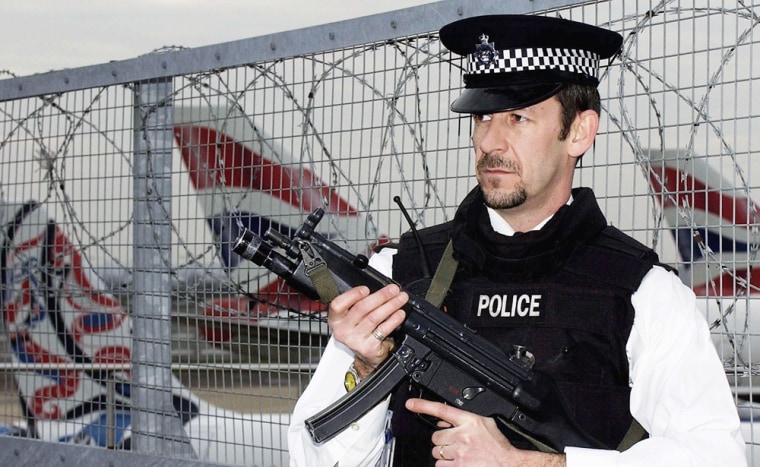Pakistan gave British authorities images of London’s Heathrow Airport and other sites that were found on the computers of two arrested al-Qaida fugitives, intelligence officials said Thursday.
It was not clear, however, if the information helped lead to the arrests of about a dozen suspected terrorists on Tuesday in Britain.
Several news reports in Britain said that one of the suspects arrested in a sweep against militants late Tuesday, variously identified as Abu Eisa al-Hindi or Abu Musa al-Hindi, was believed to be a senior member of al-Qaida, and had been plotting an attack on Heathrow.
Britain’s Metropolitan Police refused to say whether al-Hindi was among those arrested, and Pakistani officials contacted by The Associated Press had no information about the link.
Maps, photographs and other details of possible targets in the United States and Britain were found on computers belonging to Ahmed Khalfan Ghailani — a Tanzanian indicted for his role in the 1998 bombings of U.S. embassies in East Africa — and a Pakistani computer expert identified as Mohammed Naeem Noor Khan, said two officials, who spoke on condition of anonymity.
The British reports said al-Hindi, using the code name Bilal, had been in contact with Khan.
Photos of underpasses
A Lahore-based intelligence official involved in the investigation after the July 13 arrest of Khan said his computer contained photographs of Heathrow airport, as well as pictures of underpasses that run beneath several buildings in London.
He said, however, that he was unaware of any information from Khan that led directly to the arrests Tuesday of suspected terrorists in and around London.
The other Pakistani official said information from Khan and Ghailani had also been shared with the United Arab Emirates, the country through which several al-Qaida men are believed to have passed — including two South Africans arrested on July 25 along with Ghailani. He also was not aware of a link between the information and the British arrests.
Meanwhile, Interior Minister Faisal Saleh Hayyat told reporters that a total of 20 terror suspects — including Pakistanis and foreigners — had been arrested in recent weeks as part of a breathtaking sweep against al-Qaida.
Fourteen people were arrested along with Ghailani on July 25, and at least six other people have been taken in since then, according to security and intelligence officials.
Hayyat said that the arrests in Britain were not based on “specific information” passed on by Pakistan.
“There is no specific information that we gave to Britain,” Hayyat said. “What we do is that whenever we feel the need that certain information could be relevant or of use for our coalition partners, we do exchange information and we do share information and intelligence.”
The interior minister failed to clarify his statement earlier this week that Pakistan was holding an unnamed African al-Qaida suspect who has a multimillion dollar bounty on his head.
He said that two as yet unnamed al-Qaida suspects have been arrested in eastern Punjab, but that neither was on the FBI’s most wanted list or carried a bounty. A third person, who Hayyat continued to refuse to identify, is also in custody and carries a bounty, he said.
One detainee in Britain released
In Britain, police arrested 13 men, ages 19 to 32, in raids Tuesday in London, the nearby towns of Watford and Luton, and in Blackburn in northwest England, “on suspicion of being concerned in the commission, preparation or instigation of acts of terrorism.” One was subsequently released.
Authorities in Britain have released few details of what they were believed to have been up to.
The news follows reports that two South Africans captured along with Ghailani were plotting attacks in their home country.
Raja Munawar Hussain, the police chief in the eastern Pakistani city of Gujrat, told AP that authorities found several maps of South African cities among the items seized after the raid.
South African newspapers quoted unidentified police sources there as saying that key landmarks in Johannesburg, Cape Town and Pretoria were among the likely targets, though those reports were strongly denied by South African officials.
The South African suspects were identified as Feroz Ibrahim and Zubair Ismail.
“They had some terror plans for South Africa,” Hussain said. They are believed to have arrived in Pakistan on a flight from the United Arab Emirates just days before their arrest.
